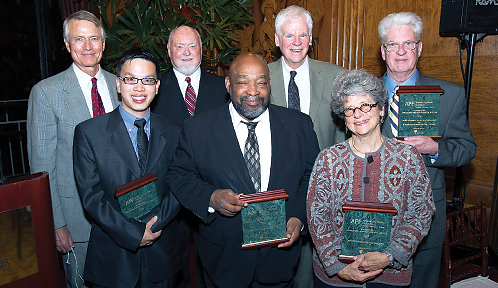Foundation Honors Programs on Minority Mental Health
Abstract
At the APA annual meeting, the American Psychiatric Foundation hands out four awards recognizing outreach and care for minority communities.

Winners of the Awards for Advancing Minority Mental Health of the American Psychiatric Foundation (APF) gather for a photo. Top row, from left: Richard Harding, M.D., APF treasurer; Paul Burke, APF executive director; James H. Scully Jr., M.D., APA medical director and CEO; awardee Jack O’Brien, L.C.S.W., of the LGBT Affirmative Action Program of the South Beach Psychiatric Center in Brooklyn. First row, from left: Awardees Benjamin Woo, M.D., Los Angeles; William Lawson, M.D., Ph.D., a professor of psychiatry at Howard University; and Sarah Herbert, M.D., accepting for the Latino Program at Positive Impact in Atlanta.
The American Psychiatric Foundation presented four $5,000 grants for advancing minority mental health at the foundation’s annual benefit dinner in San Francisco during APA’s 2013 APA annual meeting last month.
The event drew 200 guests who contributed a total of $45,000 toward the foundation’s support of mental health research and community education.
Two of the awards went to organizations helping underserved populations, and two to individuals who have devoted substantial efforts to expanding access to mental health services for minority groups.
Psychiatrist Sarah Herbert, M.D., of Atlanta accepted on behalf of Gwen Davies, Ph.D., clinical director of the Latino Program at Positive Impact in Atlanta. The program is the only provider of Spanish-speaking mental health services for people with HIV in Atlanta. It operates at four primary care clinics and trains clinicians to recognize the need for such services.
“We hope this will become a model of mental health care for Latinos,” said Davies in a letter read by Herbert. This is especially true when anti-immigration legislation often increases distrust among Latinos toward organizations offering services, added Davies.
The LGBT Affirmative Action Program of the South Beach Psychiatric Center in Brooklyn. N.Y., received a grant to further its work with low-income lesbian, gay, bisexual, and transgendered individuals with serious and persistent psychiatric disorders. The program provides community outreach, trains staff to provide LGBT-inclusive psychiatric services, and connects clients with peers.
“It’s hard for LGBT individuals to identify with mainstream services,” said co-founder Jack O’Brien, L.C.S.W., as he accepted the award. “Our patients are grateful to have our program available.”
William Lawson, M.D., Ph.D., a professor of psychiatry at Howard University in Washington, D.C., was honored for a range of research and clinical work related to the mental health needs of African Americans.
“We have to ensure that we have the leadership to address the needs of this diverse patient population,” Lawson told his fellow psychiatrists. He was specifically cited for his work with the Veterans Health Administration to overcome misdiagnosis of African-American veterans.
Finally, Benjamin Woo, M.D., was recognized for his work among the Chinese immigrant community in Los Angeles. Woo volunteers at a community health center and helped develop a culturally sensitive depression collaborative treatment model. He writes articles for Chinese-language newspapers and appears on a Cantonese-language radio station to expand understanding of mental health conditions and treatments.
“The Chinese community didn’t know how to talk about mental health, but now they do,” he said.
The awards were sponsored by Otsuka Pharmaceuticals. ■
More information about the American Psychiatric Foundation’s Awards for Advancing Minority Mental Health is posted at http://www.americanpsychiatricfoundation.org/what-we-do/awards/awards-for-advancing-minority-mental-health.



